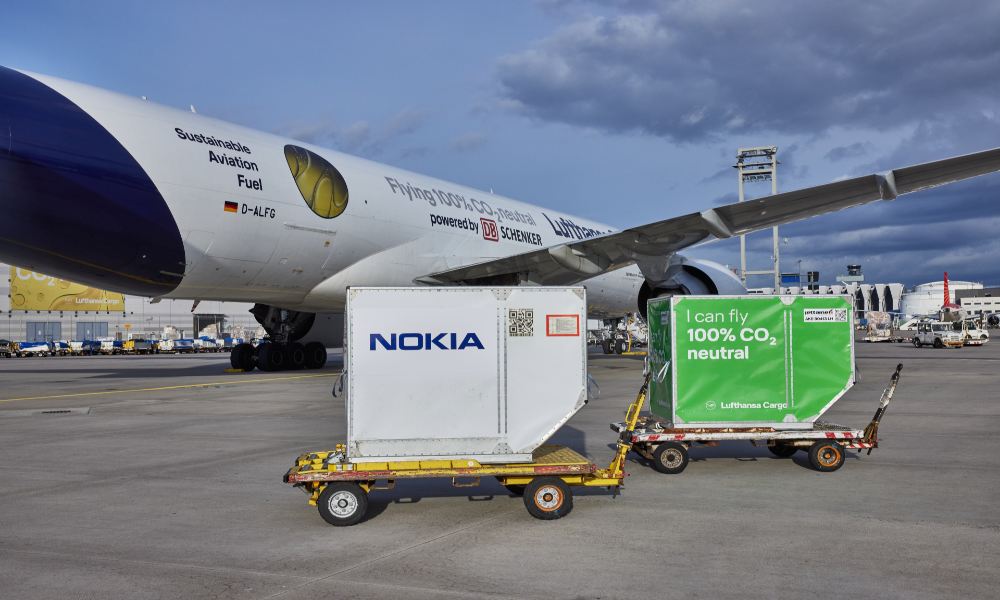
DB Schenker, Lufthansa Cargo extend CO2-free freighter flights; Nokia join forces
Every week Nokia will avoid greenhouse gas emissions by using the world’s only freighter flight 100 percent covered by Sustainable Aviation Fuel (SAF), produced from renewable waste, such as used cooking oils.

DB Schenker and Lufthansa Cargo created history on November 29, 2020, when a cargo flight flew on rotation between Europe and Asia, whose fuel requirements are completely covered by Sustainable Aviation Fuel (SAF). To continue their contribution towards a greener future, DB Schenker and Lufthansa Cargo extend their weekly CO2-free freighter flights between Frankfurt and Shanghai.
The joint mission will be continued throughout the entire winter flight schedule until March 2022. Now Nokia has signed up for the initiative. Every week, the global telecommunication network provider will avoid greenhouse gas emissions by using the world’s only freighter flight 100 percent covered by Sustainable Aviation Fuel (SAF), produced from renewable waste, such as used cooking oils.
The fuel requirement for the flight rotation from Frankfurt (FRA) to Shanghai (PVG) and back is covered entirely by SAF. This saves around 174 tons of conventional kerosene every week. During the summer flight schedule 2021, the initiative successfully achieved a net reduction of 20,250 tons of greenhouse gases (CO2e). In the upcoming winter flight schedule, from the end of October 2021 to the end of March 2022, another 14,175 tons are expected.
Thorsten Meincke, global board member for air and ocean freight at DB Schenker, “The ambitious team goal of climate neutrality affects every business and how our customers look at their footprint also in their supply chains. Together with Lufthansa Cargo, we extend our unique offer of a regular carbon-neutral flight connection. The SAF full charter flight rotation is a game-changer as it goes beyond a pay-per-use scheme. We are pleased to have Nokia on board as a new major customer for our westbound flights. Together, we can avoid CO2 and take another step towards a more sustainable future.”
Over the next five months, Nokia will be using the carbon-neutral flight offer to ship a weekly freight volume of 10 tons of communications network equipment from a production facility in Shanghai to its European hub in Tilburg in the Netherlands. This shipment is entirely covered by SAF to reduce 100% of carbon emissions during the life cycle, avoiding any offsetting.
Tommi Uitto, president of mobile networks at Nokia: “Investing in sustainable solutions is a top priority for us and a shared goal with our partners. We can only achieve our climate targets together. Innovation and working together across sectors are key to a greener supply chain. We constantly seek to reduce our transportation and logistics carbon footprint, and air cargo is a significant contributor. This collaboration to transport our 5G equipment on carbon-neutral flights is another important step.”
The end-to-end agreement with DB Schenker covers both air and land transport of goods from Shanghai to Tilburg. All land transport elements will be covered utilizing another advanced type of biofuel, hydrogenated vegetable oil (HVO).
Ashwin Bhat, chief commercial officer at Lufthansa Cargo said, “Using SAF is one possibility to fly CO2-neutral already today. We are very proud that we can extend our partnership with DB Schenker throughout the upcoming months. We strongly believe that transforming our business into CO2-neutral air freight can best be achieved when all of us join their forces.”
The SAF for this collaboration is entirely produced from waste and residue raw materials, for example from used cooking oils. Currently, SAF is around three times more expensive than conventional fossil kerosene.
The SAF used for the DB Schenker and Lufthansa Cargo flight connection is produced by Neste, a leading provider of sustainable fuel. The Finnish producer is currently increasing its Neste MY Sustainable Aviation Fuel production to 1.5 million tons annually by the end of 2023.

